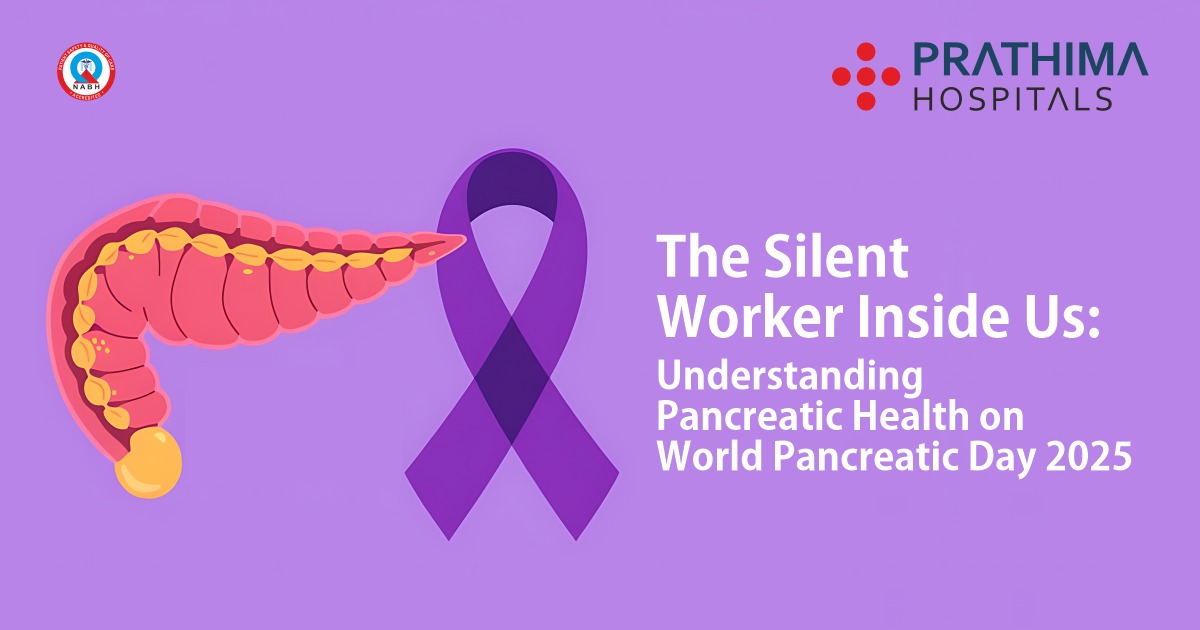The Silent Worker Inside Us: Understanding Pancreatic Health on World Pancreatic Day 2025

Most organs in the body make their presence known. The heart beats loudly. The lungs rise and fall with every breath. The stomach rumbles when we skip a meal. But the pancreas, a small organ tucked deep behind the stomach, works quietly every minute without asking for attention.
On World Pancreatic Day 2025, health experts around the world are urging people to finally bring this hidden organ into everyday conversation. This year’s global focus leans toward earlier detection, smarter awareness, and practical understanding. Without using slogans or dramatic language, the message is simple: know what your pancreas does, recognise the early signs when something goes wrong, and never ignore persistent abdominal changes.
As one of the Best Gastro hospitals in Hyderabad, Prathima Hospitals emphasizes the importance of recognizing subtle changes in digestion, abdominal patterns, and metabolic health. Without dramatic language or slogans, the core message remains simple:
Understand what your pancreas does, observe early warning signs when something goes wrong, and never ignore persistent abdominal discomfort.
Why the Pancreas Matters More Than We Realise?
The pancreas is small, but its responsibilities are huge:
1. It Helps Us Digest Food
The pancreas releases special digestive juices that break down fats, proteins, and carbohydrates. Without these enzymes, food passes through the body without being properly absorbed.
2. It Controls Blood Sugar
The pancreas makes insulin and other hormones that keep blood sugar in a healthy range.
When the pancreas struggles, digestive problems, weight loss, nutritional issues, and sudden blood sugar changes can follow. These changes are sometimes slow and subtle, which is why pancreatic diseases are often diagnosed late.
Why Pancreatic Problems Often Go Unnoticed?
Unlike many other diseases, pancreatic issues don’t always cause clear, early symptoms. Instead, they show up as:
- Upper abdominal discomfort
- Pain spreading to the back
- Repeated digestive trouble
- Oily or greasy stools
- Sudden unintentional weight loss
- New-onset diabetes in adults
- Persistent bloating, nausea, or loss of appetite
Many people mistake these signs for acidity, stress, gas, food intolerance, or age-related changes. Months may pass before they decide to see a doctor.
At the Best Hospital in Kukatpally, specialists emphasize that pancreatic symptoms are often subtle but significant. World Pancreatic Day 2025 encourages us to change this pattern, to understand that ongoing digestive changes should never be ignored.
Common Pancreatic Conditions Explained Simply
1. Acute Pancreatitis
A sudden and painful swelling of the pancreas.
Often caused by gallstones or alcohol, needs immediate medical care.
2. Chronic Pancreatitis
Long-term damage to the pancreas.
The organ slowly loses its ability to digest food and regulate sugar.
Pain may come and go, but digestion becomes weaker over time.
3. Pancreatic Exocrine Insufficiency (PEI)
When the pancreas cannot release enough enzymes.
This causes greasy stools, weight loss, and nutrient deficiencies.
Treatment involves enzyme replacement capsules taken with meals.
4. Pancreatic Cysts / Tumors
Not all cysts or tumors are cancerous. Some need simple monitoring.
Others require careful evaluation by specialists.
5. Pancreatic Cancer
One of the most serious pancreatic diseases.
Often detected late because symptoms appear only in advanced stages.
Early evaluation greatly improves treatment options.
Understanding this spectrum helps people realise that pancreatic health is not only about cancer; there are many conditions that can be managed well if identified early.
Risk Factors You Should Know
You may be at a higher risk of pancreatic diseases if:
- You smoke
- You drink alcohol regularly
- You have gallstones
- You have long-standing diabetes
- You have chronic pancreatitis
- There is a family history of pancreatic disorders
- You have obesity or metabolic issues
- You have certain genetic conditions
- Knowing these risks helps individuals and families seek earlier medical evaluation.
Recognising Symptoms Early: What people Often Miss
People often overlook early pancreatic symptoms because they resemble minor stomach issues. But the pancreas has its own pattern of warning signs:
1. Greasy, pale, or floating stools
This means your food isn’t being digested well, an early clue of enzyme deficiency.
2. Pain that moves from the abdomen to the back
A classic pancreatic pattern.
3. Unexpected weight loss without dieting
A strong reason to check pancreatic health.
4. A new diabetes diagnosis in adults without obesity
This can sometimes be linked to pancreas-related changes.
5. Persistent nausea or fullness
Often dismissed but important when repeated.
Recognising these clues early is the goal of 2025’s awareness effort.
What Doctors Look For: A Simple Clinical View?
When someone presents with suspected pancreatic issues, doctors may suggest:
- Blood tests for pancreatic enzymes
- Ultrasound
- CT scan or MRI
- Endoscopic ultrasound (EUS)
- Stool examination for enzyme deficiency
- Genetic counselling if necessary
These tests help pinpoint the issue early, even before severe symptoms start.
Early diagnosis makes a huge difference, especially in chronic pancreatitis, pancreatic insufficiency, and cancer.
Nutrition and Lifestyle: Practical Steps for Pancreatic Ease
A healthy pancreas depends heavily on eating habits and lifestyle. Simple, practical steps can help reduce stress on the pancreas:
1. Moderate fat intake
Not extremely low fat, just controlled.
Too little fat leads to poor nutrition.
Too many triggers digestive distress.
2. Small, regular meals
Large meals burden the pancreas.
Regular meal patterns help digestion.
3. Reduce alcohol
Alcohol is one of the top causes of pancreatitis.
4. Quit smoking
Smoking increases the risk of pancreatic cancer and chronic pancreatitis.
5. Maintain a healthy weight
Obesity raises inflammation around the pancreas.
6. Use enzyme supplements when prescribed
For PEI, enzymes are essential, not optional.
Why Early Attention Saves Lives?
The pancreas gives small hints before big problems arise. Listening early can change outcomes:
- When enzyme insufficiency is treated early, patients regain weight and energy.
- When chronic pancreatitis is identified early, pain episodes reduce, and pancreatic function declines more slowly.
- When pancreatic cancer is detected early, treatment options increase dramatically.
The entire push of this awareness year revolves around catching the condition early, not waiting for severe symptoms.
Pancreatic Health in Everyday Life: How People Can Be More Alert?
Here are simple behaviours that make a meaningful difference:
- Don’t ignore persistent abdominal pain.
- Don’t keep switching antacids for months without clarity.
- Document symptoms, pattern recognition helps doctors.
- Seek a specialist (gastroenterologist) early when symptoms are unusual.
- Pay attention to stools, they reflect digestion.
- Treat sudden diabetes changes seriously.
These steps may appear minor, but they often become the bridge to early detection.
Future Directions: How Medicine Is Improving Pancreatic Care?
Medical science is investing heavily in pancreatic research:
- Improved imaging for early detection
- Better biomarkers for identifying diseases sooner
- Advanced surgical techniques
- Modern enzyme therapies
- Targeted treatment for pancreatic cancer
- More precise monitoring for pancreatic cysts
The future looks promising, but awareness must match scientific progress.
Human Stories Behind the Organ
People who experienced pancreatic disease often describe similar emotions:
- confusion because the symptoms felt too ordinary
- delay because they assumed it was gastritis
- relief after a clear diagnosis
- improvement once they received proper treatment
These stories highlight one truth: understanding your own body can prevent months of silent disease progression. At the Best Hospital in Kachiguda, doctors consistently remind patients that awareness, timely evaluation, and listening to early symptoms can make a life-saving difference.
Listening to What the Pancreas Cannot Say
The pancreas does not warn loudly, but it always gives small clues.
It is an organ that deserves attention long before pain appears.
On World Pancreatic Day 2025, let’s adopt a simple approach:
- Notice persistent digestive changes
- Understand basic symptoms
- Respect risk factors
- Seek timely medical advice
- Support healthier lifestyle habits
Pancreatic health is not a complicated medical subject; it is a practical, everyday awareness.
When we understand early, act early, and respond early, we give this silent organ the protection it has always deserved.
.
.
For More Details:
📞 733 733 6600 | 040 4345 4345
🌐 https://prathimahospitals.com/book-appointment/





